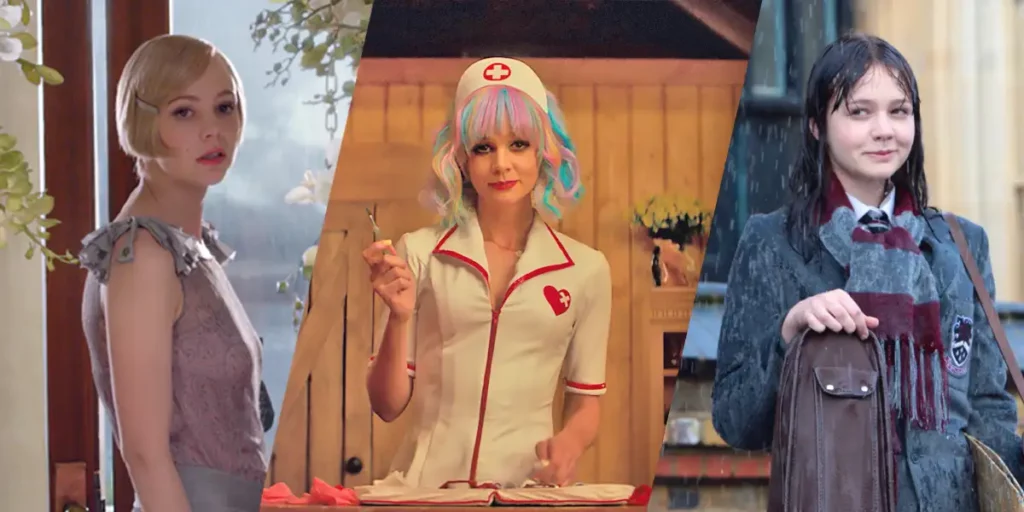In honor of the premium video-on-demand release of Promising Young Woman, we rank Carey Mulligan ’s top ten best performances to date.
Throughout her career thus far, actress Carey Mulligan has amassed a formidable list of film credits that most actors only ever dream of. To start, though she first made her film debut in 2005’s Pride & Prejudice as the squirrely Bennet sister Kitty, it was her bombastic breakthrough in 2009’s An Education that took her to new heights and earned her both the BAFTA Award for Best Actress and the BAFTA Rising Star Award. From there, Mulligan found subsequent success by starring in even more lively literary adaptations (The Great Gatsby, Far from the Madding Crowd, Wildlife) and by headlining an array of acclaimed indies from auteurs like the Coen Brothers (Inside Llewyn Davis), Steve McQueen (Shame), and Nicolas Winding Refn (Drive).
While she has yet to receive the same awards attention she garnered for An Education, that looks likely to change this season with her towering turn in Emerald Fennell’s Promising Young Woman – and now that the timely social thriller is available to rent around the world, we have taken it upon ourselves to determine where Carey Mulligan’s wondrous work as Cassie Thomas ranks among the parts of her past by listing her top 10 best performances to date.
10. IRENE
DRIVE

In another actress’s hands, Drive’s Irene could have been no more than a “helpless housewife.” Luckily, Carey Mulligan isn’t one to indulge in such surface-level stereotypes. While Irene is admittedly left out of much of the action in the film – with Ryan Gosling’s “Driver” taking care of the criminals who would put her and her young son in danger – Mulligan still adds considerable depth to a character that is commonly a cliché in most gangster movies, eliciting empathy from the audience by emotively expressing the torment she’s tolerated as an (often) single mother while her criminal husband is in and out of jail.
Additionally, her compelling chemistry with Gosling forms the foundation of the film, and if we didn’t believe how much they come to care for one another, the central story would crumble completely. Thankfully, the comfort these two closed-off characters find in each other is credible from their first interaction, and Mulligan wholly convinces us of their compassionate connection.
9. LAURA MCALLAN
MUDBOUND
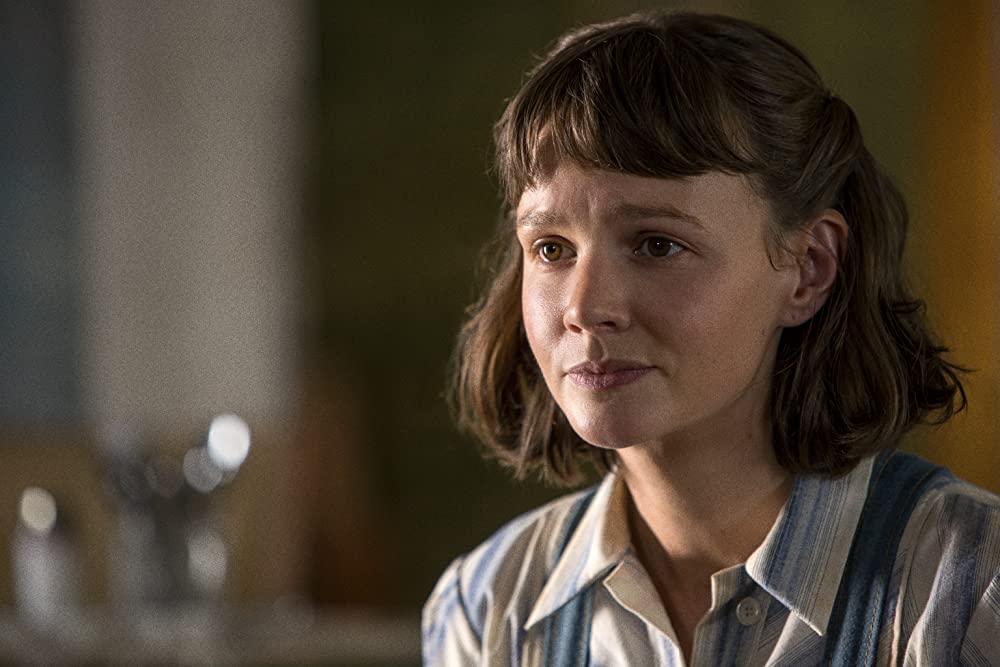
Dee Rees’ Oscar-nominated historical epic explores the clash and conflict between two families – one white, one Black – in late 1940s Mississippi, with Mulligan playing the matriarch of the white McAllans, Laura. Though tensions initially run high, Laura’s burgeoning friendship with Mary J. Blige’s Florence – the mother of the neighboring Jackson family – provides Mudbound with much of its heart and humanity, representing the bonds that can transcend racial boundaries, and Mulligan characterizes Laura’s cultural awakening with skillful sensitivity and subtlety. Likewise, she treats Laura’s later adulterous attraction to Garret Hedlund’s Jamie – her husband’s brother – with equal tact and tenderness, offering effective explanations for Laura’s emotions and considerately contextualizing her choices instead of criticizing her for how she conducts herself. Even in a slighter part, Mulligan’s acting remains as exceptionally empathetic as always.
8. MAUD WATTS
SUFFRAGETTE
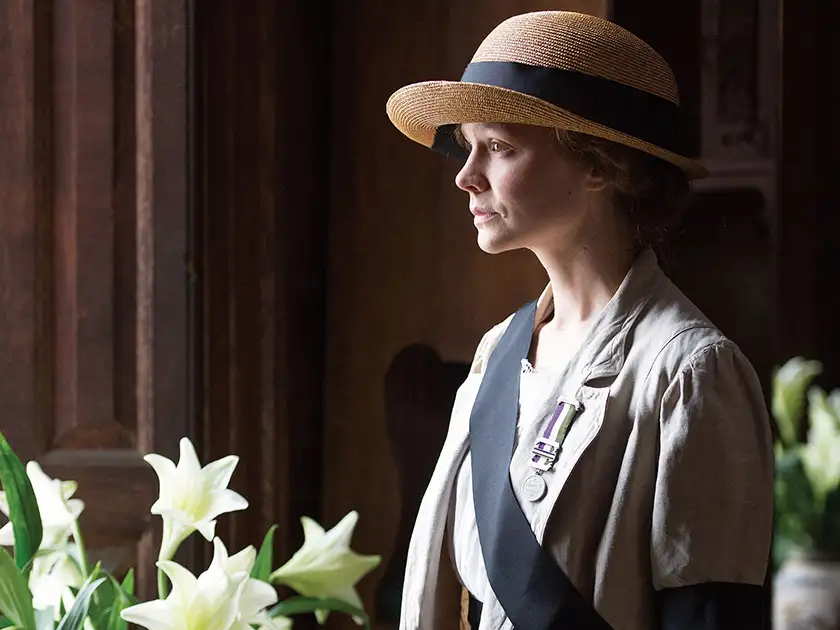
Suffragette’s Maud Watts may be a fictional character exclusively created for this film, but Mulligan demonstrates that she doesn’t need any one individual’s background to draw on to cogently communicate the struggles of the women’s suffrage movement in the mid 1910s in the United Kingdom. While Maud faces the worst of what the world has to offer – from wretched abuse in the workplace to a heartless husband to the loss of contact with her child – her resistance is relentless (and incessantly inspiring), and Mulligan carries herself with a constant courage and conviction that simply radiates off the screen. Mulligan exhibits Maud’s evolution from lowly laundry worker to radical rebel with a laudable legitimacy, allowing her progression to feel plausible and poignant as opposed to insincere and inauthentic. Mulligan’s approach to Maud’s character arc is careful and calculated but still miraculously moving when it needs to be, and this is all due to her distinguished dedication to paying respect to these real-world heroes.
7. KATHY H
NEVER LET ME GO
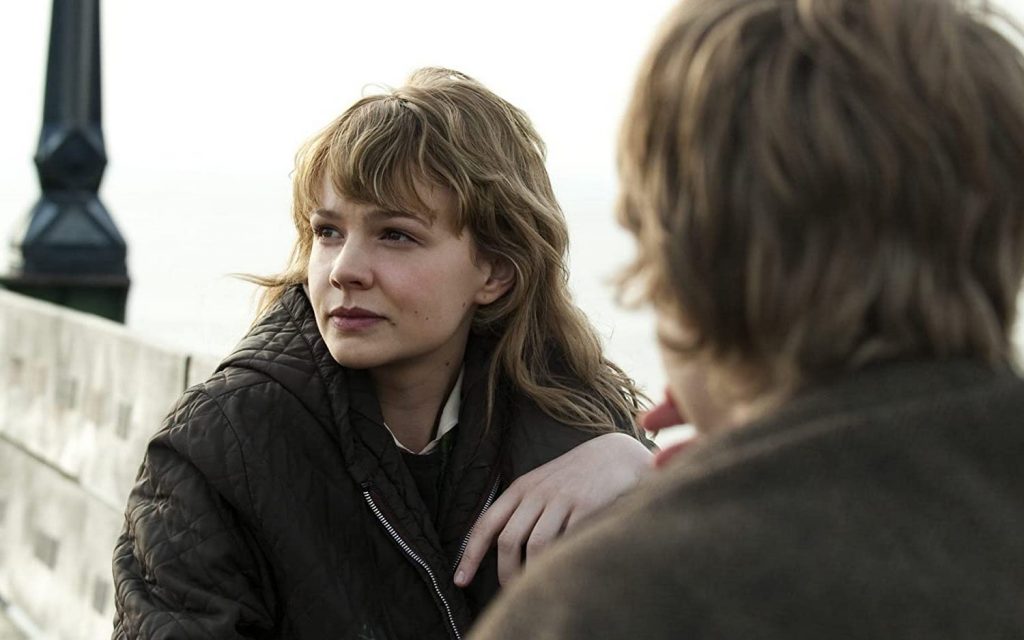
On the surface, one may mistakenly think of Never Let Me Go as a stereotypical “love triangle” tale between Mulligan’s Kathy, Andrew Garfield’s Tommy, and Keira Knightley’s Ruth, but this achingly tragic adaptation of Kazuo Ishiguro’s dystopian drama is far more sophisticated and stirring than it first seems, with most of its accomplishments attributable to Mulligan’s perceptive and profound lead performance. In the midst of Twilight mania, many would regard Never Let Me Go as another story of “star-crossed lovers” – as we witness a world where human clones (like Kathy, Tommy, and Ruth) are raised solely to be harvested for organs later in life, with no faith in a future of any kind – and yet, Mulligan makes it out to be so much more with her modest but meaningful meditations on existence and her perspicuous passion for both Garfield’s Tommy and genuine human contact in general. Kathy’s reconciliation with her mortality is riveting, and it’s thanks to Mulligan’s commitment to the film’s philosophical commentary that we walk away as conscientiously contemplative as the lead character herself.
6. DAISY BUCHANAN
THE GREAT GATSBY
In Baz Luhrmann’s The Great Gatsby, Mulligan beat out A-listers like Scarlett Johansson, Natalie Portman, and Michelle Williams for the part of Daisy Buchanan – the long-lost lover of Leonardo DiCaprio’s Jay Gatsby – and within mere minutes, we’re acutely aware of what got her the gig, as we become as beguiled by her playful presence as the title character. Mulligan perfectly personifies the radiance of the Roaring Twenties as the dashing Daisy, emitting exuberant ebullience in each and every scene and (rightfully) earning the awe and affection of everyone she encounters. Her youthful yearning for a rekindled romance with DiCaprio’s Gatsby is painfully palpable, but she’s just as stellar at selling Daisy’s recreant retreat into her riches at the end of the film. While many have tried to either entirely exalt or completely condemn Daisy, she’s far more multidimensional than these diminutive designations would suggest, and Mulligan carefully considers Daisy’s comprehensive complexity the whole way through.
5. JEAN BERKEY
INSIDE LLEWYN DAVIS
As a feisty former lover of the titular morose musician in the Coen Brothers’ dark “dramedy” Inside Llewyn Davis, Mulligan was cast against type, trading in her typical cordial charm to portray a character defined by her captivating capriciousness. Nevertheless, she proved to be just as successful in this part, superbly selling her swear-word-laden screeds against Oscar Isaac’s Llewyn and finding ways to elaborate on Jean’s enmity by honing in on the heart of her current hatred for this aimless artist. However, in spite of all her animosity towards Llewyn, Jean has richer layers of resonance lingering beneath the surface that Mulligan tends to as well, refraining from making Jean merely some “snippy shrew.” Though Jean is a supporting character in this story, Mulligan always manages to spotlight the substance of every role she plays – no matter if it’s big or small – and that talent is absolutely apparent here.
4. SISSY SULLIVAN
SHAME
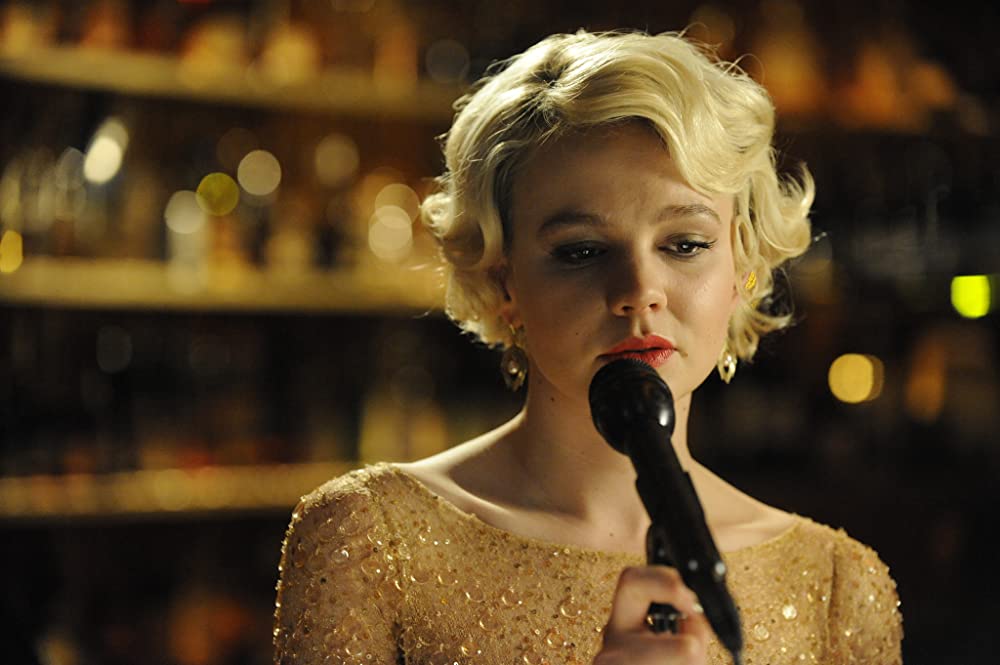
In Steve McQueen’s sex addiction drama Shame, Mulligan mystified the audience as Sissy –the high-spirited sister of Michael Fassbender’s Brandon – projecting a preening peppiness throughout the entire film whilst concurrently concealing her character’s deep-rooted distress. The suffering that Sissy shares with her brother Brandon may never be explicitly explained, but Mulligan doesn’t need some melodramatic monologue to convey her childhood trauma – this pain is always present in her gloomy glances, her elegiac expressions, and the cheerless cracks in her voice. She has no problem matching Brandon’s all-consuming anger when the two set off into several screaming matches, but it’s in the film’s more melancholy moments where Mulligan leaves the largest impression, and, most notably, in the unbroken close-up shot of Sissy sullenly singing “New York, New York” in a dinner club, drearily dreaming of a world without the woes she’s endured. Above all else, the solemnity in this scene alone will stick with you long after the credits roll.
3. JENNY MELLOR
AN EDUCATION
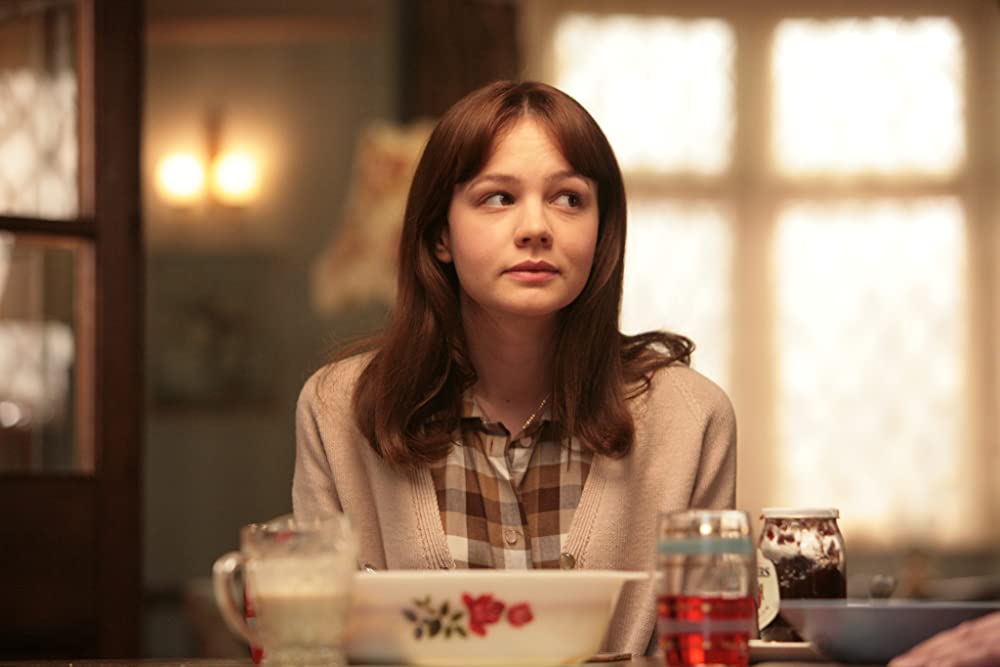
Though An Education featured an expansive ensemble cast consisting of acclaimed actors such as Emma Thompson, Alfred Molina, Rosamund Pike, Olivia Williams, and Peter Sarsgaard, relative newcomer Carey Mulligan did the impossible by not just holding her own against these icons but arguably stealing the show in her first leading role, receiving rapturous adoration and acclaim around the world and even being compared to Audrey Hepburn by some particularly passionate critics. As a 16-year-old schoolgirl who enters into a riotous romance with a charismatic con man (Sarsgaard), Jenny stumbles upon several salacious shocks and surprises throughout their tumultuous time together, but Mulligan anchors every twist and turn in authenticity, never allowing the story to become overly “soapy” and expertly embodying this antsy adolescent who is outrageously out of her depth. Her genuine grasp of the complete coming-of-age experience is beautiful to behold, and her star turn here signaled the successful career that was yet to come.
2. JEANETTE BRINSON
WILDLIFE
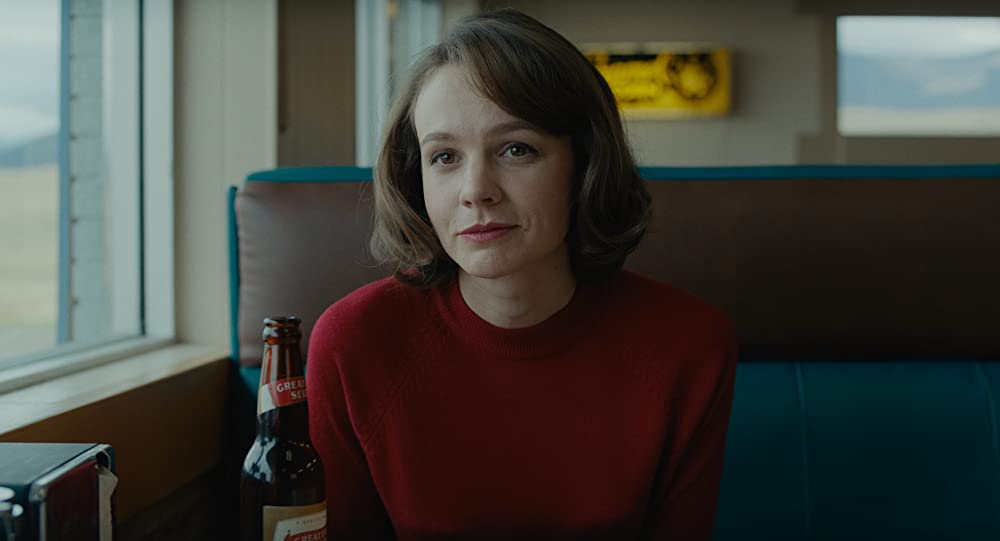
Prior to this year, Mulligan’s work in Paul Dano’s Wildlife was easily her most emotionally affecting acting achievement to date, displaying the downward spiral of mother Jeanette Brinson with deft delicacy and powerful pathos. After her husband Jerry (an equally excellent Jake Gyllenhaal) hastily departs upon becoming unemployed, Jeanette is left to care for their son, Joe, all on her own, which simultaneously spurs a midlife crisis of sorts that causes Jeanette to reconsider all of the choices she’s made in her life and mull over her many missed opportunities for finding more personal fulfillment.
Now, with free reign to do as she pleases, Jeanette allows the façade of her felicity to fracture, embarking on frivolous flights of fancy and engaging in amoral affairs with little care or concern for any consequences, leaving her startled son on the sidelines. Remarkably, the film never admonishes Jeanette for her actions, instead portraying them in their unfiltered purity and ceding the cinematic space to Mulligan to explore the full range of Jeanette’s ennui and exasperation without restraint – and she masterfully makes the most of it.
1. CASSANDRA “CASSIE” THOMAS
PROMISING YOUNG WOMAN
What’s left to say about Mulligan’s powerhouse performance in Emerald Fennell’s Promising Young Woman that hasn’t already been said? Ever since the film’s debut at Sundance 2020, her role as a vengeful vigilante-of-sorts who confronts would-be sexual assaulters about their abhorrent actions has been the talk of the town, and for good reason. Not only is Mulligan’s Cassie intensely intimidating when she needs to be – channeling the wrath of all women around the world – but her innermost anguish is just as alluring, inviting audiences to investigate the very real emotional ruination that is felt by the friends and family of individuals who are subject to sexual violence.
Cassie stands a symbol for those who have been silenced for years, illustrating their long-suppressed ire and indignation, but Mulligan stops short of playing her as some kind of feminist “superhero,” rooting her rage in realism and regularly hinting at the heartache that fuels her journey to justice. Few actresses are capable of conveying Cassie’s complications as comfortably as Mulligan does here, and for that audacious accomplishment, this will forever be seen as an acting feat for the ages.

